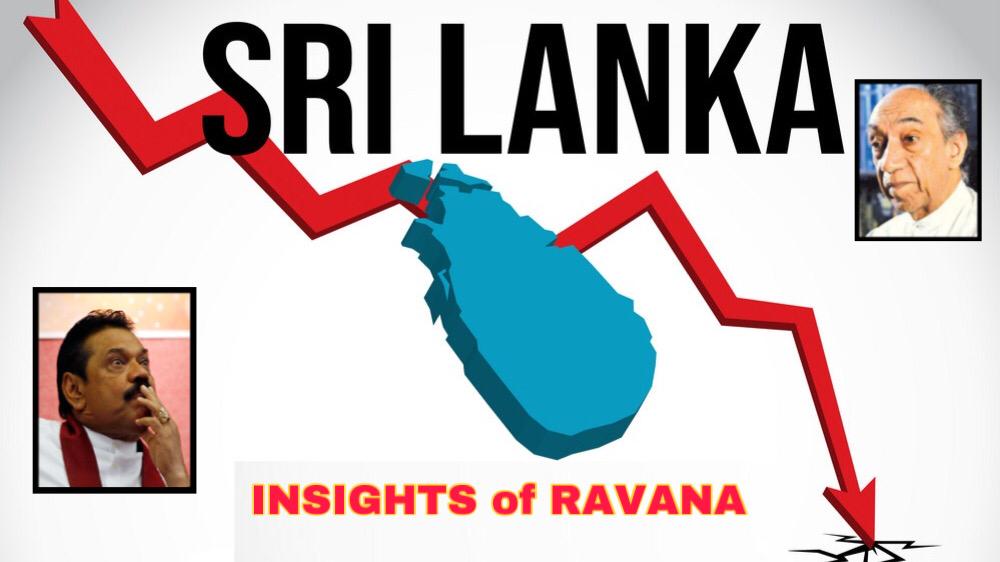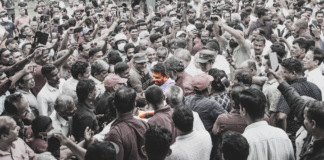The government of President Gotabaya Rajapaksa has courted controversy one after the other since February or March this year. The situation, however, has now aggravated beyond anybody’s control.
Prime Minister Ranil Wickremesinghe is also facing a dilemma while various political cliques within the establishment attempt to take control of the government once again.
Former Prime Minister Mahinda Rajapaksa, scared out of his wits over the marauding forces that fueled the backlash on May 9, has come back to the open and is now making various pronouncements on the 21 st amendment to the constitution. He emphatically outlines his point of view without being ashamed of introducing the 20th amendment to the Sri Lankan constitution that helped arrogate power to an individual contrary to all democratic norms. Peeved by the assertion that the 21st amendment will be vested with more statutory duties for the new Prime Minister Ranil Wickremesinghe, Rajapaksa objected to such a move that the SLPP would not support legislation that heaps more power on a powerless Prime Minister. He has said the objective of the 21st amendment should be to abolish the executive presidency for the benefit of the people and that parliament should acquire that power for effective management of the country.
After being in the executive presidency for two terms and introducing the infamous 18th amendment to stay in power as the executive as much as possible Rajapaksa is now in the reverse gear calling for the total abolition of the executive presidency.
All Rajapaksa family members pretended to be champions of the masses until recently when the people realised that in undeniable form, they are caparisoned in pretentious garb to mislead the people. People, in particular, have lost faith in them, and it appears a difficult task more or less to salvage the lost reputation. Basil Rajapaksa has embarked upon a new and arduous task to uplift their lost image through a new political project putting forward new faces and steering it according to his whims and fancies. It is yet another dubious attempt by the Rajapaksa clan to bring misery to the entire populace. Back in the limelight, the Rajapaksa clans are indebted to Ranil Wickremesinghe for rescuing them from a dangerous situation that loomed like the sword of Damocles. Thanks to Ranil Wickremesinghe he dissipated the growing opposition to the government and the Rajapaksa clan and dissolved to a greater extent the Galle Face green protest aimed against the Gotabaya Rajapaksa administration. Now the Rajapaksa clan is flexing their muscles, once again trying to make a comeback with a vengeance. The dubious aim is to pave the way for their kith and kin to take over the party reins.
Mahinda is meddling with governmental affairs using his leverage as the party leader, and Basil, out of Parliament, is persevering on the matter with great vigour. There would not be plain sailing for either Gotabaya Rajapaksa or Ranil Wickremesinghe with these politically motivated elements on top of all the other problems confronting them.
Statecraft is a strange business for the incumbent President, but Wickremesinghe is a seasoned man with a lot of experience behind him.
Wickremesinghe has his style of governing, but despicable efforts by many in the government may thwart him.
If the government group expects Wickremesinghe to deliver relief to the people in the shortest possible period, it would not be a reality.
The SLPP leaders who lacked economic foresight had their way and caused wanton destruction to the economy by resorting to myopic measures. In the circumstances, it would not be fair to expect Wickremesinghe to perform the way the SLPP wants since he is no politician with a magic wand.
Nevertheless, people are angry with Wickremesinghe for the covering-up played by him to shield the Rajapaksas. The allegation against Wickremesinghe is if not for him, the Rajapaksa administration would have collapsed.
Although there were high expectations among the UNP members when he took over as the prime minister, nothing much has come about from his formidable leadership. Wickremesinghe was trying hard to woo Japan to help Sri Lanka, a long-standing friend who had helped Sri Lanka on numerous occasions. Japan was one of the key donor countries to Sri Lanka. During the 2003 peace talks with the Liberation Tigers of Tamil Eelam (LTTE), Japan played a prominent role by organising a conference on the reconstruction and development of Sri Lanka parallel to the Norwegian-sponsored peace moves with the LTTE.
The Tokyo Conference on Reconstruction and Development of Sri Lanka was held on June 9 and 10, 2003, in Tokyo, with the participation of Ministers and representatives from 51 countries and 22 international organisations. The Prime Minister of Japan, Mr Junichiro Koizumi, and the Prime Minister of Sri Lanka, Mr Ranil Wickremesinghe, made opening statements. Mr Yasushi Akashi, Representative of the Government of Japan, chaired the opening session. The Tokyo conference pledged more than 4.5 billion US$ for reconstruction and development. Japan showed a keen interest in the peace process, and their assistance was commendable.
Soon after Gotabaya Rajapaksa’s victory in December 2019, the bureaucracy launched an offensive against viable projects undertaken by the yahapalanaya regime and sponsored by Japan. The first move was to suspend the Light Rail Project funded by the Japanese International Cooperation Agency (JAICA) on easy terms, at a very low-interest rate and with a substantial grace period for the repayment of the loan, much to the chagrin of the Japanese government.
The SLPP government later realised their folly for distancing a sincere friend in Japan. The government feels it more today when public anger is relentlessly heaped on them for blatant mismanagement of state affairs.
Minister G.L Peiris, on the sidelines of the 50th Sessions of the United Nations Human Rights Council in Geneva, met with the Deputy Foreign Minister of Japan to apprise him of the predicament of Sri Lanka. Peiris appreciated the Japanese help in the past and the other projects that are continuing.
Peiris also reminded the contribution made by Sri Lanka to the well-being of Japan at the San Francisco conference in 1952.
Bandu de Silva writing to the Colombo telegraph in 2015, states
28th April 1952 was the day on which the Japanese Peace Treaty officially signed by 48 countries from those who attended the San Francisco Conference of September held in the previous year came into force.
From all accounts published both in Sri Lanka (then Ceylon) and abroad, it would appear that the role played by the representative of the small island nation at the San Francisco Conference to consider the draft treaty of peace with Japan, marked a high watermark in the island’s foreign policy record since independence. The credit is largely conferred on the messenger, J.R.Jayewardene, then Finance Minister, who represented Ceylon at the San Francisco Conference. Wikipedia account of the Conference states that Minister Jayewardene’s speech received resounding applause and afterwards, the New York Times stated “The voice of free Asia, eloquent, melancholy and still strong with the tilt of an Oxford accent, dominated the Japanese peace treaty conference today.”
Besides, the government of President Gotabaya Rajapaksa has yet another arduous task before him to draw the attention of the foreign Minister to mend fences with India over remarks made by the Chairman of the Ceylon Electricity Board M.C. C Ferdinando.
Mr. Ferdinando dropped a bombshell during an inquiry by the Committee on Public Enterprises (COPE) over awarding a renewable energy project to Adani of India on an unsolicited proposal. When questioned about the criteria, he said President Gotabaya Rajapaksa wanted him to award the project to the Adani Group considering the unsolicited proposal put forward by them. President Gotabaya Rajapaksa denied that he pressurised any bureaucrat to hand it over to the Adani Group of India. Ferdinando dragged the name of Prime Minister Modi as referred to by the President. He has apparently told the President that he could not do anything about it but the BOI. Ferdinando communicated with the Ministry of Finance, and the Ministry maintained the same position.
Nevertheless, the denial by the President that he exerted pressure on anyone to hand over the renewable energy project to Adani Group prompted Ferdinando to withdraw his earlier comment. Ferdinando would be taken to task by the House of Parliament for misleading the COPE under parliamentary privileges. Ferdinando is part of history because he quit his job. A probe of what he has written to the finance ministry confirms his earlier stance kept under wraps for obvious reasons.
So are the politics of Sri Lanka battered by an unprecedented economic crisis.
Anxious people are languishing in the longest queues ever seen in contemporary history thanks to the Rajapaksa coterie for dragging the country down to doldrums, one analyst said.
Governor of the Central Bank Dr Nandalal Weerasinghe observed that we should have gone to the IMF one year before.
Governor CBSL’s comments have reached viral proportion on social media.
The daunting task before the government at this juncture is to put the country back on track.
Who would do this?
Would Wickremesinghe accomplish this task?
For him, too, time is running out fast before he evokes the public wrath for shouldering the Rajapaksa burden.





